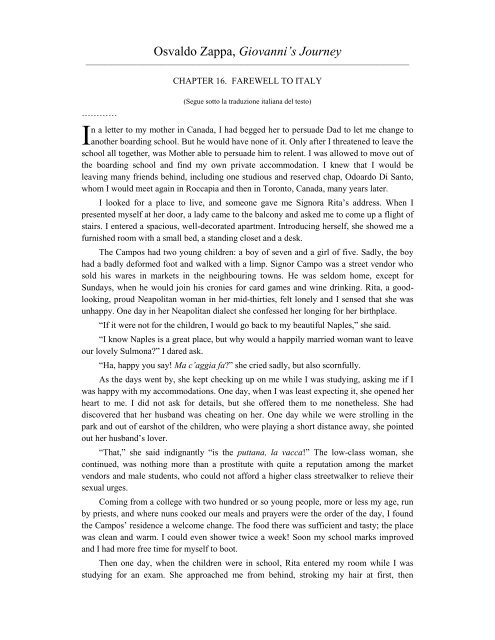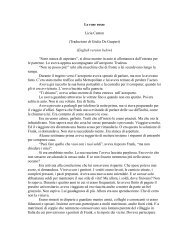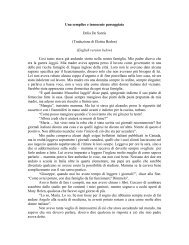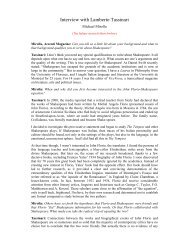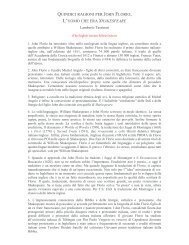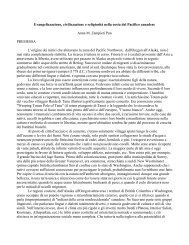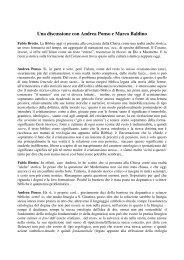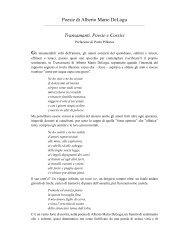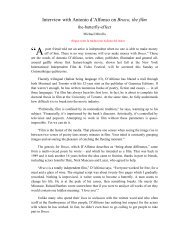Osvaldo Zappa, Giovanni's Journey
Osvaldo Zappa, Giovanni's Journey
Osvaldo Zappa, Giovanni's Journey
You also want an ePaper? Increase the reach of your titles
YUMPU automatically turns print PDFs into web optimized ePapers that Google loves.
<strong>Osvaldo</strong> <strong>Zappa</strong>, Giovanni’s <strong>Journey</strong><br />
____________________________________________________________________________________________________<br />
…………<br />
I<br />
CHAPTER 16. FAREWELL TO ITALY<br />
(Segue sotto la traduzione italiana del testo)<br />
n a letter to my mother in Canada, I had begged her to persuade Dad to let me change to<br />
another boarding school. But he would have none of it. Only after I threatened to leave the<br />
school all together, was Mother able to persuade him to relent. I was allowed to move out of<br />
the boarding school and find my own private accommodation. I knew that I would be<br />
leaving many friends behind, including one studious and reserved chap, Odoardo Di Santo,<br />
whom I would meet again in Roccapia and then in Toronto, Canada, many years later.<br />
I looked for a place to live, and someone gave me Signora Rita’s address. When I<br />
presented myself at her door, a lady came to the balcony and asked me to come up a flight of<br />
stairs. I entered a spacious, well-decorated apartment. Introducing herself, she showed me a<br />
furnished room with a small bed, a standing closet and a desk.<br />
The Campos had two young children: a boy of seven and a girl of five. Sadly, the boy<br />
had a badly deformed foot and walked with a limp. Signor Campo was a street vendor who<br />
sold his wares in markets in the neighbouring towns. He was seldom home, except for<br />
Sundays, when he would join his cronies for card games and wine drinking. Rita, a goodlooking,<br />
proud Neapolitan woman in her mid-thirties, felt lonely and I sensed that she was<br />
unhappy. One day in her Neapolitan dialect she confessed her longing for her birthplace.<br />
“If it were not for the children, I would go back to my beautiful Naples,” she said.<br />
“I know Naples is a great place, but why would a happily married woman want to leave<br />
our lovely Sulmona?” I dared ask.<br />
“Ha, happy you say! Ma c’aggia fa?” she cried sadly, but also scornfully.<br />
As the days went by, she kept checking up on me while I was studying, asking me if I<br />
was happy with my accommodations. One day, when I was least expecting it, she opened her<br />
heart to me. I did not ask for details, but she offered them to me nonetheless. She had<br />
discovered that her husband was cheating on her. One day while we were strolling in the<br />
park and out of earshot of the children, who were playing a short distance away, she pointed<br />
out her husband’s lover.<br />
“That,” she said indignantly “is the puttana, la vacca!” The low-class woman, she<br />
continued, was nothing more than a prostitute with quite a reputation among the market<br />
vendors and male students, who could not afford a higher class streetwalker to relieve their<br />
sexual urges.<br />
Coming from a college with two hundred or so young people, more or less my age, run<br />
by priests, and where nuns cooked our meals and prayers were the order of the day, I found<br />
the Campos’ residence a welcome change. The food there was sufficient and tasty; the place<br />
was clean and warm. I could even shower twice a week! Soon my school marks improved<br />
and I had more free time for myself to boot.<br />
Then one day, when the children were in school, Rita entered my room while I was<br />
studying for an exam. She approached me from behind, stroking my hair at first, then
caressing my chest. I tried to turn, but she held me tight. The scent of the mock-orange tree<br />
on the open balcony outside my room together with Rita’s perfume was overpowering.<br />
“I like you,” she whispered in my ear. At first I did not know what to make of this.<br />
When I was finally able to turn around, she sat on my lap and kissed me, her breasts<br />
straining against her white blouse. Her mouth was sensuous, her eyes deep and dark. I broke<br />
out in a warm sweat. Aside from one visit to a flophouse – there were two in Sulmona, I had<br />
no previous experience with women; I did not know how to react. She took me by the hand.<br />
“Let’s move to the divan,” she invited.<br />
This was the beginning of our affair, which lasted until I left for Canada.<br />
She saw me off when I boarded the bus for Naples. With tears in her eyes she<br />
whispered “I’ll miss you.” Then, taking a small box wrapped in colourful paper from her<br />
purse she said, “Here, this is for you.”<br />
“May I open it now?” I asked.<br />
“Oh yes, please do!” she replied, delighted.<br />
“What a beautiful scarf! May I wear it now?”<br />
“Please do; I want you to.” She removed the scarf from the package and placed it<br />
around my neck, giving me a big hug and kissing me on the lips.<br />
…………..<br />
It was early evening, as I waited on the docks in Naples for the arrival of our Greek ship<br />
bound for New York via Halifax. All around me were many other immigrants, mostly from<br />
the south of Italy, many looking tired and melancholy. Resigned, I watched the sun set<br />
quickly in shades of vermilion on the Gulf of Naples and over the Vomero Hill. The water<br />
grew still, as if in homage to those leaving their homeland. Confused in my heart and with a<br />
lump in my throat, I felt as if something in me was dying, as in the old saying “Vedi Napoli e<br />
poi muori.” Cold shivers ran up my spine.<br />
“Farewell sunshine. Is this the last time I will see you setting in my native soil?” I<br />
sighed to myself, thinking of my village, the church, the fountain, the square, the Sangro<br />
River meandering in the valley below, and the steep, rocky hills to which I escaped in the<br />
summer. In my imagination, I walked the dusty road with the village bell tolling in the<br />
distance. Was I running away from these beloved places? Was I dismantling the bridge to<br />
my town and my country? In an instant I forgot all past suffering, sweat, sacrifices and<br />
deprivations. Gone was the war, with its fierce and frosty bite, gone the days of hunger and<br />
self-denial. I was happy now. Why shouldn’t I be? Did I really need to emigrate? Did I?<br />
I suddenly became strong. “I shall return one day soon,” I assured myself. This was<br />
only a temporary excursion into the unknown. Otherwise, how could I leave behind this<br />
ancient land of my birth? I knew I was not alone. These same thoughts, perturbing as they<br />
were, were filling the hearts of the other immigrants around me as well.<br />
Mount Vesuvius was now clothed in a purple and red mantle. Soon a thousand lights<br />
would be dancing on the water and I would leave my doubts behind me in the falling<br />
shadows. I started walking along the promenade of the port. Despite the November chill, the<br />
air was sultry.<br />
Just as darkness set in, the whole port lit up. The strident shrill of a seagoing tug could<br />
be heard in the distance. Surrounded by dozens of strangers, I ran into a young student, also
from Abruzzo, whom I had met at the offices of Celidonio – the naval agency which<br />
organized our voyage – while consigning my luggage there. Young Sandro was a very blond<br />
and fair eighteen-year-old. He stood out like a white flower in a field of red poppies, quite a<br />
contrast to the rest of the swarthy immigrants.<br />
“Hello, come stai?” he greeted me, smoking a cigarette. “There are a lot of people<br />
around here, don’t you think?”<br />
“I’m a bit tired,” I replied turning towards him.<br />
“You do look a bit sallow and pale,” he continued. “Aren’t you feeling well?”<br />
“Ah, don’t pay attention to that. Must be the fatigue, I guess. You know.” I went on,<br />
“I’ve been waiting for hours, and it’s getting cold.” I was afraid to give myself away. I did<br />
not want to appear too caught up in my reveries. After all, I was three years older than<br />
Sandro. As we talked, we began walking towards a stone bench set amid two large granite<br />
pillars. Sitting down, Sandro drew a pack of Lucky Strikes from his coat pocket and lit the<br />
cigarette he had been chewing on.<br />
“What’s your destination?” he inquired spewing smoke from his nostrils.<br />
“Vancouver,” I replied.<br />
“Vancouver?” he asked incredulously. “They tell me that city is on the other side of<br />
Canada. It’ll take you a whole week by train to reach it from Halifax,” he said. “Too bad<br />
we’re not heading to the same city. My destination is Hamilton in Ontario.” He paused, and<br />
then puffed again on his cigarette. Every time he inhaled he seemed to eat the smoke which,<br />
in his mouth, had attained a real solid state, as if it were chewing gum. Yes, it would have<br />
been nice, I thought, had we been going to the same province.<br />
“I’ve got an idea.” He smiled and bending down searched in his hand case for<br />
something. He pulled out a bottle of cognac. “This rises to the occasion!” he announced<br />
lifting the bottle with teen-age bravado. Sandro offered it to me, saying grandiosely, “There,<br />
banish all thought of solitude. Today is a new day. Tomorrow we shall conquer the world<br />
and the future will be ours!”<br />
I grabbed the bottle from his hands and brought it to my lips. I drank a few gulps as if to<br />
solemnize the moment. I handed it back to Sandro and lit a cigarette, drawing hard on it. The<br />
air was much colder now. From the port I could see the city aglow around the bay. The old<br />
Castel Nuovo or Angiovino, too, had lights shining on its massive walls, and looking<br />
deserted and impregnable, now became alive, playing tricks on my mind. The jetty cast a<br />
long shadow, like a bayonet thrust in the darkness. Naples, by nightfall, had acquired a<br />
fairytale look, as in the songs that made this city famous, especially among the many<br />
immigrants, Mare Chiare, Santa Lucia.<br />
A little way off, fishermen had already cast their nets by the lamplights, while their<br />
boats rocked gently in the sea. Sandro again offered me the bottle. I did not disappoint him,<br />
but the hard liquor on an empty stomach at first made me warm and euphoric, but then hit<br />
me like a sledgehammer. I fell prey to a deep sadness, and soon after I found myself<br />
tormented beyond description by an inner fear. Aided by the liquor, I could now interpret the<br />
sadness on the faces of other immigrants as well. Here and there, hidden by the thick white<br />
pillars, parting lovers were spending a few last tender moments. One could almost hear the<br />
words being whispered in the semi-darkness, “Don’t worry dear, I will send for you as soon<br />
as I’m settled,” and, “I’ll love you forever. I’ll make plenty of money. I’ll send for you.”
There were grandparents, holding children by the hand, come to bid farewell to their<br />
dear ones. Afterwards, they would return to their villages with heavy hearts, but also hopeful<br />
for their children’s success in America.<br />
“The young have all left,” they would say afterwards. “We’re good for nothing, so we<br />
must stay behind, grow older and die in this poor, ancient land.”<br />
Soon after the Second World War, entire towns were decimated by frequent waves of<br />
emigration. New lands in the Americas and Australia needed young and strong bodies to<br />
build new cities, new roads to prosperity, while at home fields remained fallow until the<br />
strong would return from abroad, enriched both in pocket and experience. There were few,<br />
however, who for different reasons, would never go back. The fields remained fallow at first,<br />
then uncultivated altogether and overgrown with weeds. Despite the great loss of life during<br />
the war, Italy had become too populous and, especially in the southern regions, the lack of<br />
industries forced many Italians to look elsewhere for better opportunities.<br />
As the hour of departure grew near, one could hear sporadic, unrestrained outbursts of<br />
sobbing. The strong swarthy faces of the men, burned by the southern sun, had temporarily<br />
turned pale with heavy hearts. I could see myself in the faces of these Italian peasants and<br />
the tradesmen, emotional but resolute. I was one of them.<br />
…………..<br />
I looked back towards the city, thinking: Soon we’ll be casting off. In a week’s time<br />
we’ll land on foreign soil, on land that is perhaps cold, perhaps unwelcoming. There, we<br />
shall ignore our tears, we will smother our feelings. Our calluses will harden. We shall<br />
perform any trade: cut stone, dig ditches, build homes, make pizza, and work on railways.<br />
The young ones, if lucky, will go to school. Dear Country of my ancestors, accept the sacrifice<br />
of your sons and daughters. Bless, O Lord, the many who leave their homes behind.<br />
Give us strength to meet the challenge of the days to come. Others have left before us, few<br />
returned. Those who stayed adopted a new country and a new way of life. Our lives would<br />
never be the same again. The land of plenty awaited us. I only hoped that the old saying<br />
“things sweet to taste do not prove indigestion sour” was true.<br />
…………..<br />
August 1 st , 2010<br />
<strong>Osvaldo</strong> <strong>Zappa</strong>, Giovanni’s <strong>Journey</strong><br />
____________________________________________________________________________________________________<br />
CHAPTER 16. ADDIO ALL’ITALIA<br />
(traduzione di Egidio Marchese)<br />
…………<br />
I<br />
n una lettera a mia madre in Canada, l’avevo pregata di persuadere il babbo ad<br />
acconsentire ch’io mi trasferissi in un altro collegio. Ma lui non ne voleva sapere. Solo<br />
dopo le mie minacce che avrei lasciato del tutto la scuola, mia madre riuscì a convincerlo a<br />
cedere. Ottenni il permesso di lasciare il mio attuale convitto e trovarmi una nuova<br />
sistemazione. Sapevo che avrei lasciato dietro di me molti amici, fra i quali uno studioso e
iservato compagno, Odoardo Di Santo, che avrei rivisto nuovamente a Roccapia e poi a<br />
Toronto, in Canada, molti anni dopo.<br />
Cercai un posto in cui stare, e qualcuno mi dette l’indirizzo della signora Rita. Quando<br />
mi presentai alla sua porta, una signora si sporse dal balcone e mi disse di salire su per la<br />
rampa di scale. Entrai in un appartamento spazioso e ben arredato. Mi presentai e la donna<br />
mi mostrò una camera ammobiliata con un piccolo letto, un armadio ed un tavolo.<br />
I Campo aveva due giovani figli: un bambino di sette anni e una di cinque. Il piccolo<br />
aveva la triste deformazione di un piede e camminava zoppicando. Il signor Campo era un<br />
venditore ambulante che vendeva la sua merce nei mercati dei paesi vicini. Stava di rado a<br />
casa, eccetto le domeniche, quando si riuniva coi suoi amici a giocare a carte e bere vino.<br />
Rita, una fiera napoletana di bell’aspetto a metà dei suoi trent’anni, si sentiva desolata e<br />
intuivo che fosse infelice. Un giorno mi confessò nel suo dialetto che rimpiangeva il suo<br />
paese d’origine.<br />
“Se non fosse per i bambini, tornerei nella mia bella Napoli,” disse.<br />
“So che Napoli è una gran città, ma perché una donna felicemente sposata vuole<br />
lasciare la nostra piacevole Sulmona?” osai chiederle.<br />
“Ah, felice, dice! Ma c’aggia fa?” si lamentò tristemente, e anche in modo scontroso.<br />
Col passare dei giorni, mi teneva d’occhio mentre studiavo, mi chiedeva se fossi<br />
contento della mia sistemazione. Un giorno, quando meno me l’aspettavo, mi aprì il suo<br />
cuore. Non chiesi dettagli, ma lei me li offrì tuttavia. Aveva scoperto che suo marito la<br />
tradiva. Un giorno mentre facevamo una passeggiata nel parco, senza essere uditi dai<br />
bambini che stavano giocando ad una certa distanza, puntò il suo dito all’amante di suo<br />
marito.<br />
“Quella,” disse con indignazione “è la puttana, la vacca!” La donna di basso rango,<br />
continuò, era nient’altro che una prostituta con una nota reputazione tra i venditori del<br />
mercato e i giovani studenti, che non potevano permettersi una migliore passeggiatrice da<br />
marciapiede per sfogare i loro bisogni sessuali.<br />
Io che venivo da un collegio con circa duecento giovani, più o meno della mia età,<br />
gestito da preti e suore che cucinavano i pasti, dove le preghiere erano all’ordine del giorno,<br />
trovavo la residenza dai Campo un benaccetto cambiamento. Il cibo era sufficiente e<br />
saporito, il luogo pulito e ben riscaldato. Potevo anche fare la doccia due volte alla<br />
settimana! I miei voti a scuola erano migliorati e avevo più tempo libero per me stesso.<br />
Un giorno, mentre i bambini erano a scuola, Rita entrò nella mia camera mentre<br />
studiavo per un esame. Si avvicinò a me da dietro, scompigliò prima i miei capelli, e poi<br />
cominciò ad accarezzarmi al petto. Cercai di girarmi, ma lei mi teneva stretto. L’odore del<br />
fior d’angelo dal balcone aperto della camera, insieme al profumo di Rita, mi sopraffaceva.<br />
“Mi piaci,” bisbigliò al mio orecchio. Dapprima non sapevo cosa pensare. Quando alla<br />
fine riuscii a girarmi, lei era seduta sulle mie ginocchia e mi baciava, il suo seno teso contro<br />
la sua bianca camicetta. La sua bocca era sensuale, gli occhi profondi e scuri. Io mi sciolsi<br />
in un caldo sudore. Eccetto una mia visita in un bordello – ce n’erano due a Sulmona – non<br />
avevo alcuna esperienza con le donne; non sapevo come reagire. Lei mi prese per la mano.<br />
“Andiamo sul divano,” m’invitò.<br />
Questo fu l’inizio della nostra relazione, che durò fino a quando partii per il Canada.
Venne a vedermi quando presi l’autobus per Napoli. Con le lacrime agli occhi,<br />
bisbigliò: “Mi mancherai.” Poi, estraendo dalla borsa un pacchetto avvolto in una carta<br />
colorata, disse: “Qua, questo è per te.”<br />
“Posso aprirlo adesso?” chiesi.<br />
“Oh sì, prego, aprilo!” replicò, compiaciuta.<br />
“Che bella sciarpa! Posso indossarla adesso?”<br />
“Sì, prego, voglio che l’indossi.” Rimosse la sciarpa dal pacchetto e me l’avvolse al<br />
collo, dandomi un forte abbraccio e baciandomi sulle labbra.<br />
…………..<br />
Era il crepuscolo, e stavo nella zona portuale di Napoli ad aspettare l’arrivo della nostra<br />
nave greca diretta a New York via Halifax. Tutt’intorno a me c’erano molti altri emigranti,<br />
soprattutto meridionali, molti dei quali apparivano stanchi e melanconici. Osservavo<br />
rassegnato il sole che discendeva rapido al tramonto tra tinte di vermiglio sul golfo di Napoli<br />
e sula collina del Vomero. L’acqua divenne immobile, come per un omaggio a chi lasciava<br />
la patria. Confuso nel cuore e con un groppo alla gola, sentivo come se in me morisse<br />
qualcosa, come nel vecchio detto: “Vedi Napoli e poi muori.” Un freddo brivido mi passò<br />
per la schiena.<br />
“Addio sole splendido. È questa l’ultima volta che ti vedo tramontare sulla mia terra<br />
natale?” Sospirai con struggimento, pensando al mio villaggio, la chiesa, la fontana, la<br />
piazza, il fiume Sangro che serpeggia nella valle di sotto, e le ripide, rocciose colline nelle<br />
quali fuggivo d’estate. Nella mia immaginazione, ho camminato nella strada polverosa al<br />
suono della campana del paese che si udiva a distanza. Stavo fuggendo da questi amati<br />
luoghi? Dismantellavo il ponte col mio paese e la mia patria? In un istante dimenticai tutte le<br />
passate sofferenze, il sudore, i sacrifici e le privazioni. La guerra con i suoi feroci e gelidi<br />
morsi era passata, passati i giorni della fame e dell’autodiniego. Ora ero felice. Perché avrei<br />
dovuto non esserlo? Avevo bisogno veramente di emigrare? Veramente?<br />
Improvvisamente mi sono sentito forte. “Ritornerò un giorno, presto,” mi sono detto,<br />
rassicurandomi. Questa era solo una temporanea escursione nell’ignoto. Altrimenti, come<br />
potrei lasciarmi indietro la mia antica terra dov’ero nato? Sapevo di non essere solo. Questi<br />
stessi pensieri, conturbanti com’erano, riempivano anche i cuori degli altri emigranti intorno<br />
a me.<br />
Il monte Vesuvio adesso era coperto da un manto violaceo e rosso. Presto un migliaio di<br />
luci avrebbero danzato nell’acqua ed io avrei abbandonato dietro di me i miei dubbi al calare<br />
dell’oscurità. Cominciai a camminare longo la passeggiata del porto. Nonostante il freddo di<br />
novembre l’aria era afosa.<br />
Appena l’oscurutà si estese, l’intero porto s’illuminò. A distanza si poteva udire lo<br />
strappo stridente e straziante di un bastimento. Circondato da dozzine di sconosciuti,<br />
m’imbattei in un giovane studente, anche lui abruzzese, che avevo incontrato negli uffici di<br />
Celidonio, l’agenzia navale che organizzava il nostro viaggio, mentre consegnavamo lì i<br />
nostri bagagli. Il giovane Sandro era un diciottenne molto biondo e affabile. Si distingueva<br />
come un fiore bianco in un campo di papaveri rossi, alquanto in contrasto con il resto degli<br />
emigranti di carnagione scura.<br />
“Ciao, come stai? mi salutò, fumando una sigaretta. “C’è molta gente qui in giro, non ti<br />
pare?”
“Sono un po’ stanco,” risposi girandomi verso di lui.<br />
“Mi sembri un po’ giallastro e pallido,” continuò. “Non ti senti bene?”<br />
“Ah, non farci caso. Sarà la fatica, credo. Lo sai,” continuai, “sono stato ad aspettare<br />
per ore, e comincia a far freddo.” Avevo paura di scoprirmi, non volevo apparire troppo<br />
preso dalle mie fantasticherie. Dopo tutto ero tre anni più grande di Sandro. Mentre<br />
parlavamo, cominciammo a camminare verso una panchina di pietra tra due grossi pilastri di<br />
granito. Sedendosi, Sandro trasse un pacchetto di Lucky Strikes dalla tasca del suo cappotto<br />
e accese la sigaretta, dopo averla rosicchiata.<br />
“Qual è la tua destinazione?” indagò, emettendo fumo dalle narici.<br />
“Vancouver,” risposi.<br />
“Vancouver?” domandò incredulo. “Mi dicono che la città è dall’altra parte del Canada.<br />
Ti ci vuole un’intera settimana in treno per arrivarci da Halifax,” disse. “Peccato che non<br />
andiamo alla stessa città. La mia destinazione è Hamilton in Ontario.” Ebbe una pausa e poi<br />
aspirò di nuovo la sigaretta. Ogni volta che inalava sembrava che mangiasse il fumo, che<br />
nella sua bocca semprava acquistare una solida consistenza, come se fosse gomma da<br />
masticare. Sì, sarebbe stato bello se fossimo andati alla stessa provincia, pensai.<br />
“Ho un’idea.” Sorrise e si piegò giù cercando nel suo bagaglio a mano qualcosa. Tirò<br />
fuori una bottiglia di cognac. “Questo è all’altezza della situazione!” annunciò, sollevando la<br />
bottiglia come una bravata da adolescente. Oggi è un nuovo giorno. Domani conquisteremo<br />
il mondo e il futuro sarà nostro!”<br />
Afferrai la bottiglia dalle sue mani e me la portai alle labbra. Bevvi alcuni sorsi come<br />
per solennizzare il momento. La restituii a Sandro e accesi una sigaretta, aspirando<br />
profondamente. L’aria era molto più fredda adesso. Dal porto potevo osservare la città<br />
ardente intorno alla baia. Anche il vecchio Castel Nuovo o Angiovino aveva luci che<br />
brillavano sulle sue massicce mura apparendo deserto e inespugnabile, e ora diventava vivo,<br />
suscitando nella mia mente effetti magici. Il molo proiettava una lunga ombra, come una<br />
baionetta infilzata nel buio. Napoli al tramonto aveva assunto un visione da favola, come<br />
nelle canzoni che hanno fatto famosa questa città, specialmente tra gli emigrati, Mare<br />
Chiare, Santa Lucia.<br />
Poco distanti, dei pescatori avevano già ritirato le loro reti presso i lampioni, mentre le<br />
loro barche ondulavano dolcemente sul mare. Sandro mi offrì ancora la sua bottiglia. Non lo<br />
delusi, il forte liquore e lo stomaco vuoto all’inizio mi avevano reso accalorato ed euforico,<br />
ma poi fui come colpito da una mazza. Una profonda tristezza m’invase, e poco dopo una<br />
profonda paura cominciò a tormentarmi dentro in modo indescrivibile. Con l’aiuto dell’alcol<br />
potevo ora decifrare anche la tristezza stampata nelle facce degli altri emigranti. Qua e là,<br />
nascosti dai grossi pilastri bianchi, innamorati in procinto di separarsi consumavano ora gli<br />
ultimi fuggitivi momenti di tenerezza. Si potevano quasi sentire le parole che venivano<br />
sussurrate nella mezza oscurità: “Non ti preoccupare, cara, ti farò venire appena mi sarò<br />
sistemato,” e: “Ti amerò per sempre. Guadagnerò molti soldi. Ti farò venire.”<br />
C’erano nonni e nonne venuti a dare l’addio ai loro cari, tenendo i bambini per mano.<br />
Sarebbero tornati ai loro villaggi, alla fine, con i cuori gonfi ma anche fiduciosi del successo<br />
dei loro figli in America.<br />
“I giovani sono tutti partiti,” avrebbero detto dopo. “Noi non siamo più buoni a nulla,<br />
perciò dobbiamo restare indietro, invecchiare e morire in questa povera, antica terra.”
Subito dopo la seconda guerra mondiale, interi paesi erano stati decimati dalle frequenti<br />
ondate di emigrazione. Nuove terre nelle due Americhe e nell’Australia avevano bisogno di<br />
giovani forti per costruire nuove città, nuove strade di prosperità, mentre in patria i campi<br />
rimanevano tenuti a maggese, fino a quando i forti espatriati non sarebbero ritornati<br />
dall’estero arricchiti sia di soldi che di esperienza. Ma c’erano pochi che per differenti<br />
ragioni non sarebbero mai più tornati. I campi prima a maggese finivano poi per essere<br />
completamente incolti, sopraffatti da erbacce. Nonostante la grande perdita di vite umane<br />
durante la guerra, l’Italia era diventata sovrappopolata, e soprattutto nelle regioni del sud la<br />
mancanza di industrie spingeva molti italiani a cercare altrove nuove opportunità.<br />
Mentre l’ora della partenza si avvicinava, si potevano sentire sporadici, irrefrenabili<br />
scoppi di singhiozzi. Le forti scure facce degli uomini, bruciate dal sole meridionale, erano<br />
diventate temporaneamente pallide, i loro cuori gonfi. Potevo vedere me stesso nelle facce<br />
di questi contadini e artigiani italiani, emozionati, ma risoluti. Ero uno di loro.<br />
…………..<br />
Mi volsi a guardare indietro la città, pensando: presto saremo tagliati fuori. Nel giro di<br />
una settimana sbarcheremo in una terra straniera, una terra che sarà forse fredda, forse ostile.<br />
Là dovremo ignorare le nostre lacrime, reprimeremo i nostri sentimenti. I nostri calli<br />
s’induriranno. Dovremo fare ogni mestiere: spezzare pietre, scavare canali, costruire case,<br />
fare pizza, lavorare nelle ferrovie. I giovani, se fortunati, andranno a scuola. Cara Patria dei<br />
miei antenati, accetta il sacrificio dei tuoi figli e figlie. Benedici, o Signore, i tanti che<br />
lasciano indietro le loro case. Dà loro la forza di affrontare le sfide dei giorni a venire. Altri<br />
sono partiti prima di noi, pochi sono tornati. Quelli rimasti hanno adottato un nuovo paese e<br />
una nuova vita. Le nostre vite non saranno mai più le stesse. La terra dell’abbondanza ci<br />
aspetta. Spero solo che il vecchio detto “le cose dal sapore dolce non causano amara<br />
indigestione” sia veritiero.<br />
1 agosto 2010


